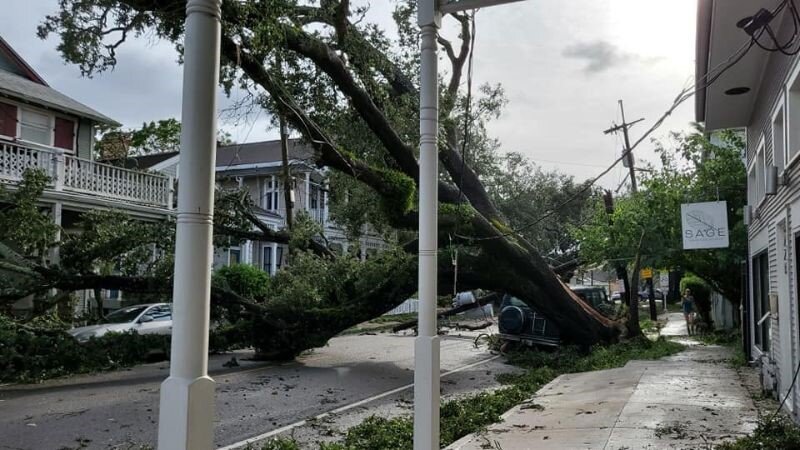
Sustainability and Climate Action
Issue Brief
Not intended as a comprehensive study, this Issue Brief is designed to build mutual understanding of the topic, spark conversation, and inspire action at the local and state levels.
Case Studies
Coming soon: Brief examples of work in the field, with tips, lessons learned, and contacts.
In the meantime, visit the National Trust’s Case Study Explorer to see its growing collection of examples — and add your own!
Webinar Recordings
Calculating Carbon Savings from Building Retrofit and Reuse
This 2022 webinar explored the new Carbon Avoided Reuse Estimator (C.A.R.E.) tool, a “carbon calculator” that allows preservationists, developers, policymakers, and others to compare the carbon impacts of specific reuse, retrofit, and replacement scenarios.
Understanding Climate Change
This 2021 webinar from the National Trust and the National Park Service offers a basic understanding of the role of cultural resources in climate change mitigation and adaptation, as well as specific resources and guidelines to begin climate work.
Learn More
Below are some readings to learn more about this issue. It is not meant to be comprehensive; rather a place for common understanding of the issue. Also visit the Resources page.
Reports/Articles
Preservation, Sustainability, and Equity (2021), edited by Erica Avrami. This volume in the Columbia University’s Preservation Policy series includes a chapter by Sara Bronin on Adapting National Preservation Standards to Climate Change, one by James Lindberg on Avoiding Carbon: Mitigating Climate Change through Preservation and Reuse, and other excellent and provocative pieces from colleagues in academia and preservation practice.
Future of Our Pasts: Engaging Cultural Heritage in Climate Action, International Council on Monuments and Sites (2019). The report explains how cultural heritage relates to the goals of the Paris Agreement, “including heightening ambition to address climate change, mitigating greenhouse gases, enhancing adaptive capacity, and planning for loss and damage.”
The Greenest Building: Quantifying the Environmental Value of Building Reuse, National Trust Preservation Green Lab (2011). Through analysis of eight building types in four climate zones this research study found that it can take between 10 and 80 years to overcome the carbon debt that is incurred when an existing structure is replaced, even if the new building is highly energy efficient.
Plans/Technical Guidelines
Advisory Council on Historic Preservation Climate Action Plan (2021) and Progress Report (2022).
Architecture 2030 CARE Tool. The CARE Tool estimates the operational and embodied carbon emissions associated with reusing and upgrading an existing building or replacing it with new construction.
Climate Heritage Network 2022 - 2024 Climate Action Plan.
Cultural Resources Climate Change Strategy, National Park Service.
Illustrated Guidelines on Sustainability for Rehabilitating Historic Buildings, National Park Service (2011). These guidelines provide recommendations for making historic buildings more sustainable in a way that preserves their historic character and meets the Secretary of the Interior’s Standards for Rehabilitation.
Guidelines on Flood Adaptation for Rehabilitating Historic Buildings, National Park Service (2019). These guidelines provide recommendations and examples for adapting historic buildings to be more resilient to flooding risk in a way that preserves their historic character and meets the Secretary of the Interior’s Standards for Rehabilitation.
Realizing the Energy Efficiency Potential of Small Buildings
Weather It Together, City of Annapolis (2015). This model Cultural Resource Hazard Mitigation Plan highlights the city’s efforts to address the local impacts of climate change on cultural resources through proactive hazard mitigation planning. Interactive maps, participatory GIS, surveys, photo crowdsourcing, and other elements provide a platform for resident and stakeholder involvement.
Funding Sources
Flood Mitigation Assistance Grants provide funding to states, local communities, federally recognized tribes, and territories. Funds can be used for projects that reduce or eliminate the risk of repetitive flood damage to buildings insured by the National Flood Insurance Program.
Hazard Mitigation Assistance Grants provide funding for eligible mitigation measures that reduce disaster losses.
Preparedness Grants support to efforts to build, sustain, and improve our capability to prepare for, protect against, respond to, recover from, and mitigate terrorism and other high-consequence disasters and emergencies.
Resilience Grants provide funding related to dam safety and earthquake risk.
These grants are from the Federal Emergency Management Agency (FEMA). If you know of other grant programs specific to this issue, please let us know!
Also see the Funding page for general preservation funding opportunities.
Learn More
Organizations/Programs
Advisory Council on Historic Preservation Climate Change & Sustainability Initiative. This initiative of the Advisory Council offers a wide range of resources on climate adaptation and resilience, energy conservation and weatherization, community livability and smart growth, and climate impacts to Tribal and Native Hawaiian properties.
Climate Heritage Network. This worldwide, mutual support network of government agencies, NGOs, universities, businesses, and other organizations works to achieve the ambitions of the Paris Agreement by re-orienting climate policy, planning, and action at all levels to account for dimensions of culture, from arts to heritage.
Keeping History Above Water, Newport Preservation Foundation.
National Main Street Center’s Disaster Preparedness and Resilient Program
Share
Do you have a best practice, case study, example, tool, or other resource that might help others? Please email it to Jim Lindberg or Rebecca Harris at jlindberg@savingplaces.org or rharris@prespartners.org. Thank you!
Top Photo: Damage in New Orleans as a result of Hurricane Ida in September 2021. Photo: Preservation Resource Center of New Orleans


